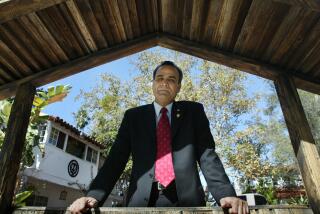Ex-Andersen Executive to Plead Guilty
- Share via
WASHINGTON — David B. Duncan, the former Andersen accounting executive who oversaw the auditing of Enron Corp., has reached a deal to plead guilty to obstruction of justice in connection with the shredding of documents and is expected to enter a formal plea today, a government official close to the case said Monday.
Duncan’s plea, once finalized, promises the Justice Department a critical boost in its efforts to develop possible fraud and conspiracy charges against Enron and its top executives.
Duncan has emerged as a pivotal figure in the federal probe of document destruction at Andersen, which was Enron’s auditor. During Duncan’s tenure, Andersen employees allegedly shredded numerous documents that could have shed light on Enron’s business activities.
Duncan is expected to appear in U.S. District Court in Houston at 2 p.m. today for a hearing before Judge Melinda Harmon, at which time he will enter a plea of guilty to obstruction charges, according to the official, who asked not to be identified. The plea deal is still pending.
The key aspect of the deal from the government’s perspective was Duncan’s agreement to give full cooperation in the Justice Department’s Enron investigation, the official said.
Duncan would be the first person known to have reached a plea deal in the Enron scandal, and prosecutors will be looking to him to provide a road map to the complex, off-the-books business arrangements that allowed Enron to effectively hide hundreds of millions of dollars in losses from its shareholders.
Andersen is negotiating separately with the Justice Department to resolve obstruction-of-justice charges brought against the firm in an indictment last month. The company’s top lawyer met with the Justice Department last week to discuss a possible settlement, but sources said no deal is imminent.
Andersen fired Duncan in January in a move that many litigators saw as an attempt to pin the problems arising from the Enron audit on him. At the time, Andersen said Duncan organized the effort by its Houston office to destroy thousands of documents after learning of an inquiry by the Securities and Exchange Commission.
In announcing Duncan’s firing, Joseph F. Berardino, Andersen’s managing partner at the time, said, “Based on our actions today, it should be perfectly clear that Andersen will not tolerate unethical behavior, gross errors in judgment or willful violation of our policies.”
Duncan later defended his actions saying that he was following the advice of Nancy Temple, an in-house attorney at Andersen’s headquarters.
Temple was asked about her instructions to Duncan during a March deposition in the class-action lawsuit filed by the University of California regents and other plaintiffs against Andersen and Enron’s senior management.
She declined to answer any questions, citing her 5th Amendment right to keep silent 138 times.
Accounting experts saw Andersen’s strident stance against Duncan as an odd strategy. They said that typically, accounting firms facing probes and litigation place the partner who headed the problem audit “on ice” while the matter sorts out.
They don’t allow the individual to do more audits, but they don’t fire the person, because they want the partner to testify on the firm’s behalf.
Indeed, Lynn Turner, the former chief accountant for the Securities and Exchange Commission, predicted the day Andersen fired Duncan that he would become a witness for the government.
*
Times staff writer Jerry Hirsch contributed to this report.
More to Read
Inside the business of entertainment
The Wide Shot brings you news, analysis and insights on everything from streaming wars to production — and what it all means for the future.
You may occasionally receive promotional content from the Los Angeles Times.








